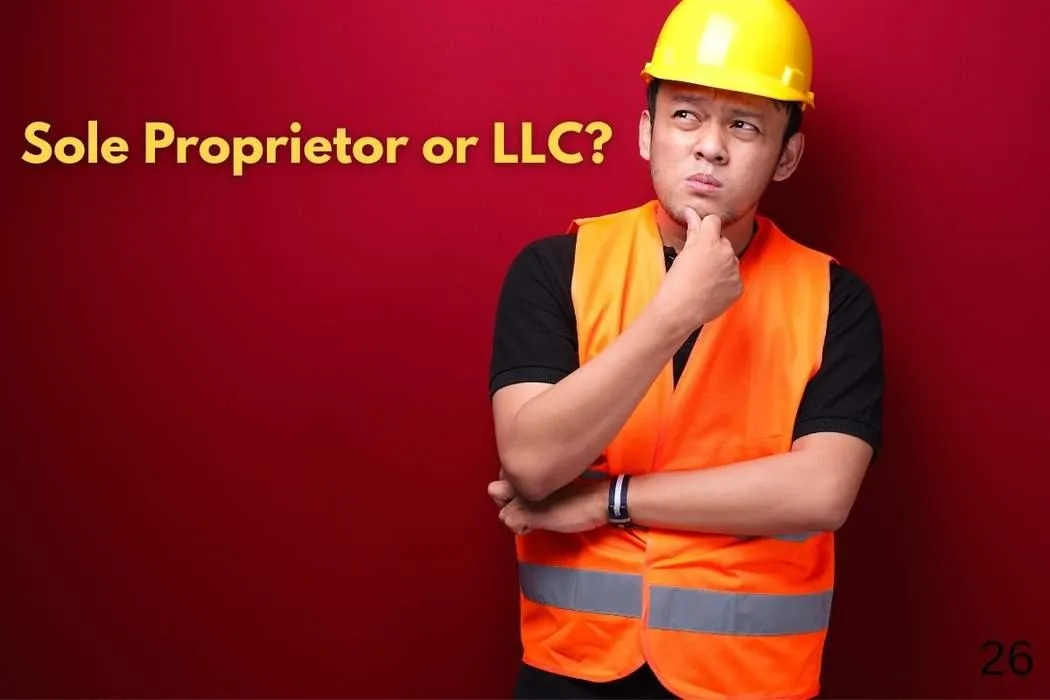
Sole Proprietor vs LLC for Contractors | California Contractor Guide
Sole Proprietor vs. LLC: Which Business Structure Is Right for Your Contractor Business?
Starting a contractor business in California is exciting, but one of the first and most important decisions you’ll face is how to structure your company. For most small and mid-sized contractors, the choice often comes down to operating as a sole proprietor or forming a limited liability company (LLC). Each option has its own legal, financial, and licensing implications—especially when it comes to insurance and contractor license bonds.
In this guide, we’ll break down the key differences between a sole proprietorship and an LLC, outline the pros and cons for contractors, and explain how each structure affects your compliance with California contractor bonds, liability insurance, and long-term growth.
Why Business Structure Matters for Contractors
Choosing your business structure isn’t just about taxes—it determines:
Personal liability exposure (are your personal assets at risk if something goes wrong?).
Bonding and insurance requirements (the contractor license bond must match your business name exactly).
Credibility with clients and lenders.
Ability to expand, hire employees, or take on bigger projects.
The Contractors State License Board (CSLB) requires all active contractors to maintain a $25,000 contractor license bond. Whether you operate as a sole proprietor or LLC, your bond and insurance must reflect your registered business name and license number. Failing to align these can lead to suspensions or fines.
Sole Proprietorship for Contractors
A sole proprietorship is the simplest and most common structure for small contractor businesses, especially for handymen, carpenters, or subcontractors just starting out.
Key Features:
Owned and operated by one individual.
No separate legal entity—the business and owner are legally the same.
Easy to set up with minimal paperwork.
Pros of a Sole Proprietorship
Simplicity – No formal filing with the state beyond your CSLB license and bond.
Lower startup cost – Aside from the CSLB license fee and contractor bond premium, you avoid additional state filing fees.
Full control – All business decisions rest with you, without needing partner or member approvals.
Tax reporting is simple – Income is reported on your personal tax return (Schedule C).
Cons of a Sole Proprietorship
Unlimited personal liability – If a project leads to a lawsuit, your personal assets (home, car, savings) are at risk.
Insurance and bond alignment risk – Your general liability insurance and bond must exactly match your personal name and license record. Any discrepancy could lead to delays or suspensions.
Difficult to grow – Raising capital or taking on larger commercial projects is harder without the credibility of a business entity.
Self-employment taxes – You’ll pay Social Security and Medicare on all profits.
LLC for Contractors
An LLC (Limited Liability Company) is a more formal business entity that combines liability protection with flexible taxation. For contractors who plan to scale, hire employees, or work on larger projects, an LLC often makes more sense.
Key Features:
Separate legal entity from its owners (called “members”).
Owners generally aren’t personally liable for business debts or lawsuits.
Requires registration with the California Secretary of State.
Pros of an LLC
Personal asset protection – Your home and personal savings are shielded from business claims (except in cases of fraud or negligence).
Professional credibility – Operating as “ABC Construction LLC” carries more weight with clients, subcontractors, and lenders.
Flexible taxation – You can choose pass-through taxation (like a sole proprietor) or elect to be taxed as an S-Corp for potential savings.
Easier growth – Adding members, bringing in investors, or qualifying for larger bonding capacity is smoother.
Cons of an LLC
Higher cost – California requires a $70 formation fee, an $800 annual franchise tax, and biennial Statement of Information filings.
More paperwork – You must maintain an operating agreement and keep records.
Bonding requirements – If your LLC employs workers, you must also file a $100,000 LLC employee/worker bond in addition to the standard $25,000 license bond.
Insurance and Bonding Requirements by Structure
Regardless of structure, California contractors must carry certain insurance and bonds:
Contractor License Bond – $25,000 for all contractors.
General Liability Insurance – Not always required by CSLB, but clients and contracts often demand it.
Workers’ Compensation Insurance – Required if you hire employees.
LLC Employee/Worker Bond – $100,000, mandatory for LLCs.
📌 Pro Tip: The name on your bond and insurance must match your CSLB license exactly—if you switch from a sole proprietorship to an LLC, you’ll need to update and refile your bond.
Tax Considerations
Sole Proprietorship – Taxes are reported on your personal return. No separation between business and personal income.
LLC – More flexible. By default, taxed like a sole proprietorship, but you can elect S-Corp taxation to potentially lower self-employment taxes.
For contractors who earn more than $100,000 annually, the LLC structure often provides long-term tax savings—especially if combined with proper accounting and payroll.
Which Structure Is Right for Your Contractor Business?
If you’re just starting, work on smaller residential projects, and want the simplest path: Sole proprietorship may be right for you.
If you want to grow, protect your assets, and take on bigger projects: LLC is usually the smarter choice.
Ultimately, your decision should weigh:
Risk tolerance (are you comfortable putting personal assets on the line?).
Growth goals (do you plan to hire employees or scale operations?).
Bonding requirements (will you need the extra $100,000 LLC bond?).
FAQs: Sole Proprietor vs. LLC for Contractors
1. Do I need a new bond if I switch from sole proprietor to LLC?
Yes. Your contractor bond must always match your legal business name on file with CSLB.
2. Which structure is cheaper for contractors?
A sole proprietorship has lower upfront and ongoing costs. However, an LLC may save money in the long run through tax benefits and liability protection.
3. Does an LLC guarantee protection from lawsuits?
An LLC protects your personal assets, but general liability insurance is still critical to cover business risks.
4. Are LLCs required to carry more bonds?
Yes. In addition to the $25,000 license bond, LLCs must carry a $100,000 employee/worker bond.
5. Can I run a contractor business without forming an LLC?
Yes, many California contractors operate as sole proprietors. But you must still maintain your CSLB license, contractor bond, and required insurance.
Final Thoughts
Deciding between a sole proprietorship and an LLC is one of the most important early steps in starting your contractor business. While a sole proprietorship may be cheaper and easier to set up, an LLC offers stronger protections and scalability—especially when paired with the right insurance and bonding coverage.
👉 Ready to protect your business and stay CSLB compliant? Get started today with a fast, affordable contractor license bond or request a quote for contractor liability insurance from Budget Bonds.

